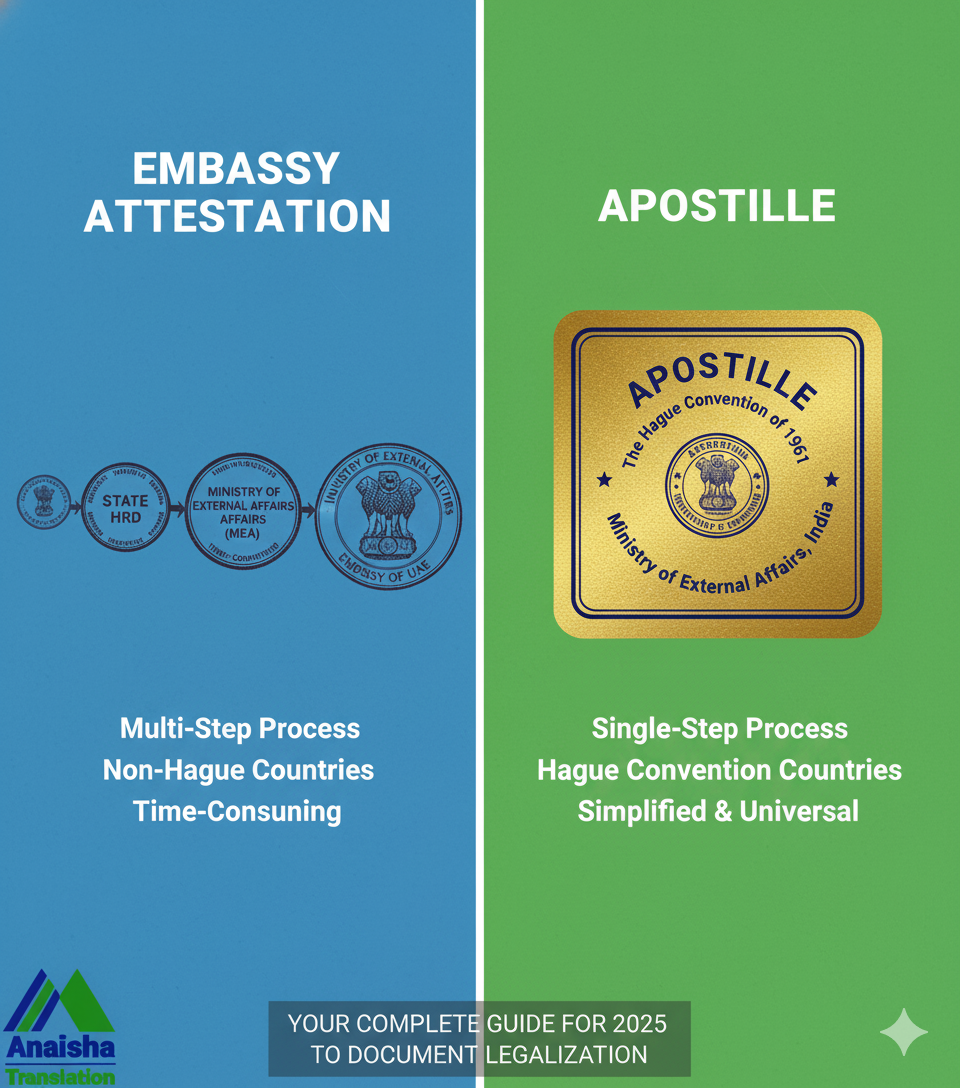Apostille vs. Embassy Attestation: Your Complete Guide for 2025 to Document Legalization
As global opportunities continue to expand in 2025, the need for internationally recognized documents has become more critical than ever. If you’re planning to pursue higher education, secure a job, or start a new life abroad, you’ll quickly encounter the terms “Apostille” and “Embassy Attestation.” These processes are the official gatekeepers that grant your Indian documents validity on the world stage.
However, choosing the wrong path can lead to significant delays, financial loss, and even rejection of your applications. This comprehensive guide will demystify both procedures, helping you navigate the requirements with clarity and confidence, right from your starting point in Hyderabad.
The Fundamental Question: Where Are You Going?
The entire choice between an Apostille and Embassy Attestation hinges on a single, crucial factor: Is your destination country a member of the Hague Apostille Convention of 1961?
Apostille: This is a simplified, internationally recognized form of certification. If your destination country is one of the 120+ members of the Hague Convention (e.g., USA, UK, Australia, Germany, France, Spain, Japan), a single Apostille sticker from India’s Ministry of External Affairs (MEA) is all you need.
Embassy Attestation: This is the traditional, multi-step legalization process required for countries that are not part of the Hague Convention. This includes many nations in the Middle East and some in Asia (e.g., UAE, Qatar, Kuwait, Saudi Arabia, Canada, China, Vietnam). This process culminates with a final stamp from the destination country’s embassy in India.
At a Glance: Key Differences in 2025
| Feature | Apostille | Embassy Attestation |
| Applicability | For Hague Convention Member Countries | For Non-Hague Convention Countries |
| Process Complexity | Simpler, standardized 3-step process | More complex, multi-layered 4-step process |
| Final Authority | Ministry of External Affairs (MEA), India | The Embassy/Consulate of the Destination Country |
| Timeline | Generally faster (can be done in 7-15 working days) | Slower (often takes 3-6 weeks or more) |
| Cost | More economical due to fewer steps | More expensive due to additional embassy fees |
| Validity | Valid in all 120+ Hague member countries | Valid ONLY in the specific country that provided the attestation |
The Step-by-Step Journey of Your Document
As per current regulations, you cannot submit documents directly to the MEA. The entire process must be handled by authorized outsourced agencies. Here’s how the journey looks from Hyderabad.
The Apostille Process (For Hague Countries)
Step 1: State-Level Attestation This is the foundational verification, authenticating the document within its state of origin (Telangana, in this case).
Educational Documents (Degrees, Transcripts): Attestation is done by the Human Resource Development (HRD) Department, Government of Telangana.
Personal Documents (Birth/Marriage Certificates): Attestation is done by the State Home Department or General Administration Department (GAD).
Commercial Documents: Attestation is done by the Chamber of Commerce.
Step 2: MEA Apostille Once the state-level attestation is complete, the authorized agency submits your document to the Ministry of External Affairs (MEA). The MEA verifies the state attestation and affixes the Apostille sticker. This sticker contains a unique identification number and is the final step. Your document is now legally recognized in all Hague Convention nations.
The Embassy Attestation Process (For Non-Hague Countries)
Step 1: State-Level Attestation This step is identical to the Apostille process. Your educational, personal, or commercial documents must first be verified by the relevant department in Telangana (HRD, GAD, etc.).
Step 2: MEA Attestation After the state-level stamp, the document goes to the MEA. Here, instead of an Apostille, the MEA applies a general “Attestation” stamp. This stamp confirms the authenticity of the state authority’s seal, making it ready for the final, crucial step.
Step 3: Embassy Attestation This is the final and most important stage. The MEA-attested document is submitted to the embassy or consulate of your destination country (e.g., the UAE Embassy in New Delhi). The embassy officials verify all prior attestations and apply their final seal or stamp. Only after this stamp is your document considered valid for use in that specific country.
Common Documents That Require Legalization
Educational: Degree Certificates, Diplomas, Mark Sheets, Transcripts.
Personal: Birth Certificates, Marriage Certificates, Affidavits, Police Clearance Certificates (PCC), Experience Certificates.
Commercial: Power of Attorney, Invoices, Certificates of Origin, Memorandums of Association.
Crucial Tips for a Smooth Process in 2025
Confirm the Requirement First: Before starting, always confirm the exact type of legalization (Apostille or Embassy Attestation) required by your foreign university, employer, or government body. This is the most critical step.
Start Early: Embassy Attestation, in particular, is a lengthy process. Begin at least 1-2 months before your deadline to account for potential bureaucratic delays.
Use a Reputable Agency: Partnering with an experienced and MEA-authorized agency in Hyderabad is essential. They have the expertise to prevent common errors, manage logistics, and provide tracking for your valuable original documents.
Keep Originals Safe: Do not laminate your documents. Ensure they are in pristine condition, as any damage can lead to rejection.
Understand the Nuances: Some countries may have additional requirements, such as translation of the document into their native language. A professional service can guide you on these specific needs.
Conclusion
While the procedures for document legalization can seem daunting, they are manageable with the right knowledge. The key lies in identifying your destination country’s legal framework—whether it adheres to the Hague Convention or not. By understanding the clear distinction between an Apostille and Embassy Attestation, you can save invaluable time and resources, ensuring your journey abroad begins on a smooth and successful note.
- +91 - 9100392160
- info@anatranslation.com
- 4-6-71, Esamia Bazar, Koti, Hyderabad- 500027, Telengana

